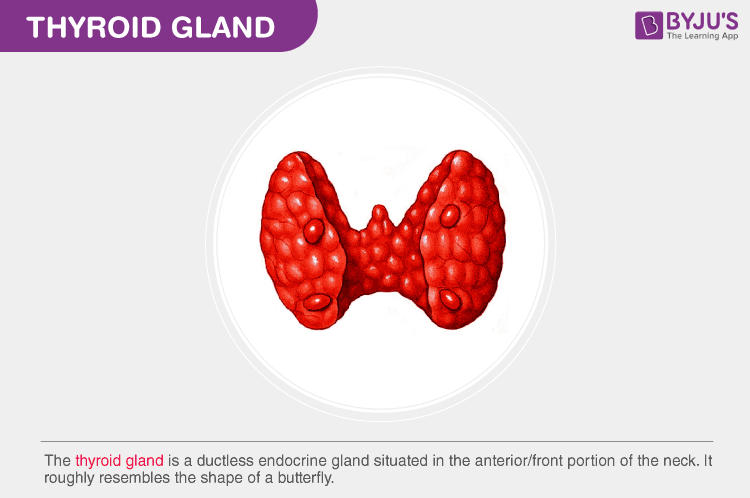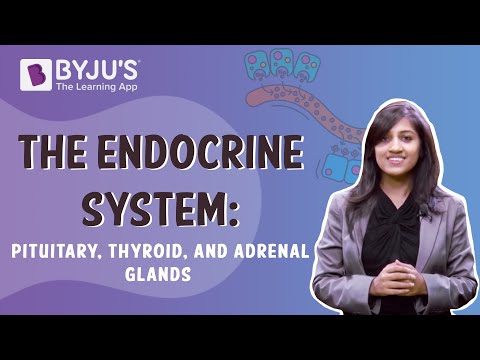What is Thyroid Gland?
The thyroid gland is a ductless endocrine gland situated in the anterior/front portion of the neck. It roughly resembles the shape of a butterfly. It is also one of the largest endocrine glands, weighing an average of 25 – 30 g. This gland has two lobes on either side of the trachea, with each lobe measuring 4 – 6 cm in length and 1.3 – 1.8 cm in width.
The primary function of the thyroid gland is to secrete two hormones, namely, Triiodothyronine (T3) hormone and the Thyroxine hormone (T4). Both T3 and T4 hormones play a very important role and affect almost every tissue in the body.
Also Read: Thyroid Stimulating Hormone

Thyroid Gland Location
The thyroid gland is located in the anterior neck between C5 and T1 vertebrae. It consists of two lobes and parathyroid glands are present on their posterior surfaces.
Thyroid Hormones
There are two thyroid hormones:
- T4: Thyroxine (Tetraiodothyronine)
- T3: Triiodothyronine
T4
Thyroxine is a hormone secreted by the thyroid gland in the bloodstream. It then travels to the organs such as kidneys and liver where it gets converted into and gets converted into its active form triiodothyronine.
T3
It is a thyroid hormone that affects physiological processes such as growth, development, metabolism, etc.
Also Read: Symptoms of Thyroid
Thyroid Symptoms
Sometimes, symptoms of a thyroid disorder are not very obvious. This is because there are various other factors that can induce similar symptoms and usually, the treatment is given according to the symptoms. For instance, excessive tiredness may be associated with sleep apnea, narcolepsy etc, but the underlying symptoms may actually be thyroid related. Some of the common symptoms of the thyroid are:
- Nervousness
- Poor concentration and knowledge retention
- Change in the menstrual cycle
- Increased heart rate
- Muscle aches
- Weight gain
- High level of cholesterol
Recommended Video:

Thyroid Gland Disorders
The thyroid gland is susceptible to many disorders and diseases. These problems might be due to the excess secretion of hormones, unusual growth of the gland, malignant lumps etc. Also, scientists have theorized a relationship between stress and thyroid health. i.e., stress may actually aggravate the underlying thyroid condition. Some of the common thyroid problems are:
Goitre
It is an excessive enlargement of the thyroid gland often obstructing the oesophagus or other organs in the neck and chest by causing difficulty to eat and breathe.
Thyroid cancer
It is a very common form of cancer. However, the chances of survival for a thyroid cancer patient is quite high compared to other forms of cancer. There are four types of thyroid cancer, namely:
- Papillary thyroid cancer
- Follicular thyroid cancer
- Medullary cancer
- Anaplastic thyroid cancer
Hyperthyroidism
This condition is caused when thyroid glands excessively produce a hormone called thyroxine. The symptoms include a change in appetite, unexpected weight loss, insomnia, fatigue, irritability, frequent urination, increased sweating and heat intolerance. But this condition usually resolves within a few months of relevant treatments and proper medication.
Hypothyroidism
This condition is caused by the under-secretion of the thyroid hormones. It is a very common problem and often stays undetected for years. One of the main reasons that trigger hypothyroidism is an autoimmune disorder called Hashimoto’s disease. In this condition, the antibodies produced by the body attack the thyroid gland and this results in the glands producing fewer hormones.
Thyroid Treatment
The most common treatment available for thyroid problems like hyperthyroidism is to replace thyroxine with another synthetic man-made hormone called levothyroxine ( or L-thyroxine). It is an injectable and an oral medication that can return the balance in the thyroid glands. Patients will experience a reduction in the symptoms of hyperthyroidism in a few weeks post medication.
Cancer in the thyroid gland could be treated quite successfully with radiation. Thyroid cancer would be difficult to diagnose sometimes as it shows no signs or symptoms. A periodic checkup is essential for preventing such diseases from taking root.
Also Read: Thyroid Cancer
For more detailed information about the thyroid gland, its anatomy, symptoms, function, disorders, location, hormones, keep visiting BYJU’S website or download BYJU’S app for further reference.
Further Reading
| Antigens and Immunology | Immune System – Innate Immunity |

Comments